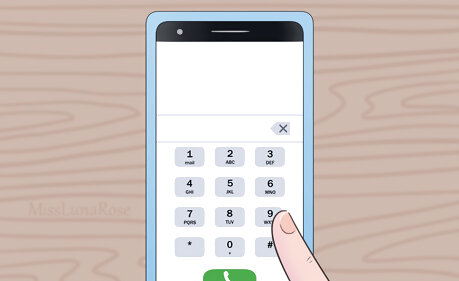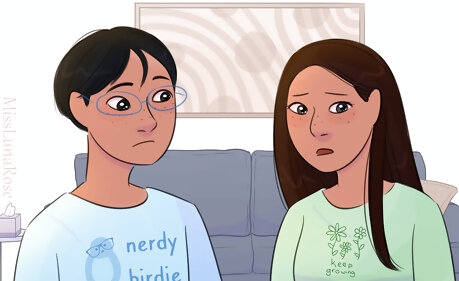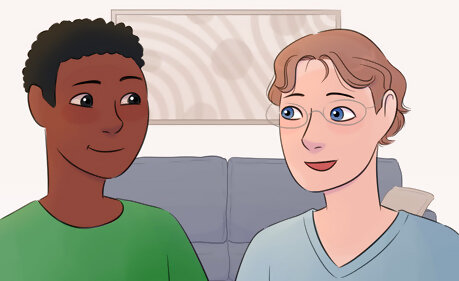
views
Understanding the Situation

Find out why you are struggling to accept the person. There can be many reasons for this. Take some time to consider what's bothering you. Try writing your thoughts in a hidden journal if it helps you parse them out. Take your time and try to find the root of what's upsetting you. Moving too fast: It's understandable to be alarmed if your loved one has gotten married after less than a year of dating, or if they haven't given you time to get to know the spouse before the marriage. Family drama: If the marriage caused or became entangled in family conflicts, you might feel torn or upset on behalf of a family member. Personality conflict: It's not always easy when your personality clashes with the personality of your loved one's spouse. It can be especially hard if you feel that your loved one deserves better. Personal prejudices: If you're uncomfortable with the fact that the person is LGBT+, of a different race, of different religious beliefs, obese, or otherwise different, then you may need to work on dealing with your personal biases. Personal issues: Sometimes it has nothing to do with the other person, such as being afraid that your family member will stop spending time with you or being reminded of a difficult relationship. Concerns about harm: If you've noticed clear unkind behavior (such as name-calling, controlling, theft, manipulation, cheating, etc.), then you'll understandably be worried about your loved one.

Recognize that mishandling the issue could create consequences for your family relationships. It can be hard to know how to proceed when you're upset about a marriage. Directly opposing it, or engaging in passive-aggressive behavior (like snide remarks or the cold shoulder) could cause trouble. Your loved one may feel that you don't trust or value their judgment. The spouse may feel awkward or uncomfortable, wondering why you dislike them. Other family members may side with the spouse if you make a scene or cause friction in the family.

Recognize toxic or out-of-line behavior. Many cases of family friction are innocent. But it's more than a personality clash if the spouse is intentionally mistreating other people. Here are some examples of problem behavior: Calling names Making fun of someone, teasing after being asked to stop Playing pranks that upset others, even after being asked to stop Stealing Breaking and entering Sexual harassment Saying racist, homophobic, sexist, or otherwise prejudiced things (even if it's "just a joke") Trampling or ignoring clearly-set boundaries Excluding, neglecting, or bullying a childTip: If someone is behaving this way, then the problem isn't you accepting a spouse. It's setting boundaries and handling their behavior.

Know that abuse should be taken seriously and approached with care. There's a huge difference between disliking someone and fearing that they are abusive. If you believe you've seen warning signs of abuse, then it's natural to be worried and conflicted about what to do. Get expert advice for how to help your loved one. Telling if someone is being abused isn't always easy. Consider calling an abuse hotline or meeting with a counselor who specializes in abuse. You can describe what you've seen and ask for advice handling the situation. Helping someone leave an abusive relationship is no easy task, especially if your loved one doesn't realize it's abuse or is still making excuses for it. Some attempts to help can backfire, so research the problem and don't be afraid to ask an expert for advice.This article focuses on non-abusive relationships. If your loved one is being abused, try reading our article on helping someone leave an abusive relationship.
Taking Action

Give them some space while you think. Trying to change them or turn people against them is likely to backfire. Give the person space to open up and try to make them feel at home. It takes time to adjust for anyone in a new home, give the person that time. Put yourself in their shoes and try to think of the situation from their point of view too. You may have gotten a bad impression. Things may get better with time and once you've gotten more acquainted. Remember that just because you don't "click" with them doesn't mean that they're a bad spouse for your loved one.

Talk to your family member. Even if you think you've been subtle, your loved one has probably noticed your less-than-happy attitude about their spouse. Take them aside to a quiet place and have a heart-to-heart about your relationship with their spouse. Use "I" language to explain that you have a problem and you need help. For example: "I've had some difficulty accepting Wendy. I guess it's just moving so fast and it startled me. I care a lot about you and it surprised me that you got married to someone I barely know. But I don't want to alienate her or you. Do you have any advice?" "Sometimes Amil's jokes make me really uncomfortable and I don't know what to say." "Dad, I've been kind of struggling with Keiko. I know she makes you happy, and I want you to be happy. But at the same time, I'm still grieving Mom and sometimes it feels like Keiko is trying to be my new mom when I'm just not ready. I think I need some time and space to process because I still miss Mom so much." "You've probably noticed that I'm having trouble getting along with Asher. I get upset when I hear him making comments about your weight. I can see it makes you sad and I hate that. I don't know what to do when this happens."Tip: Your loved one needs to know that this is coming from a place of caring, not judgment. Show that you feel this way because you care about them (even if it turns out that you're misguided), not because you're judging their spouse.

Consider a heart-to-heart with the spouse. Tell the person why you have difficulty in accepting them. Act compassionate, and apologize if needed. "I'm sorry for the things I said about you, Diamond. I love my son so much and sometimes I act overprotective. But the truth is that he's happy with you, and I would be a bad mother if I tried to get in the way of that. I want you to feel welcome in this house." "Kiante, I realize that I've been a little aloof and distant towards you. I guess I've been having a hard time accepting that my baby bro is gay. That's my problem, not yours, and I realize that you're the type of guy who will treat him right. I'm truly sorry, and I hope we can be friends." "Lana, I'm sorry I've been awkward with you. The truth is, I'm still reeling from the divorce. It feels like this happened so fast. It's not your fault, though. I just need to work on adjusting to the new normal. I know that you make Dad happy and I think that's a good thing."
Getting Along with a Well-Meaning Person

Try to be friendlier with the spouse. Find out what you have in common with the person. You both might like the same TV show, music or you both share might share the same hobby. Ask them about their dreams and goals. Share family jokes. You can also talk about their partner. You might find a good friend in that person.

Look for what your family member sees in them. After all, they are married to your loved one, not to you. Search for their individual strengths. Try to see how, even if they aren't a good match for you, they are right for your family member.

Share. You have to do a lot of sharing when a new person joins the family. You'll share dinner tables, company, and loved ones. But the good part is that you also get to share your responsibilities, love, thoughts and feelings. Look for ways to share positive experiences together.

Take the high road when mishaps occur. The spouse may make mistakes or put their foot in their mouth. Try to handle it graciously. Give them the benefit of the doubt.

Be forgiving. Everyone has faults. How would you feel if someone judged you as harshly as you were judging the spouse? Try to ease up a little and give them the benefit of doubt.

Make up. Even if you fight with the person make it up as soon as you can. Do not let the bitterness of a fight affect your relationship.




















Comments
0 comment